|
|
|
Sort Order |
|
|
|
Items / Page
|
|
|
|
|
|
|
| Srl | Item |
| 1 |
ID:
143259
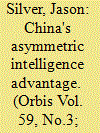

|
|
|
|
|
| Summary/Abstract |
China's government has the ability to compel Chinese companies and its citizens working in the United States to assist the Chinese government with the broadly defined mission of “safeguarding State security.” As such, new safeguards should be put in place to better protect U.S. national security. These safeguards must ensure that the industries which make up the U.S. critical infrastructure are better protected. By mimicking Chinese trade and investment policies as appropriate and by using existing trade tools and strengthening the Committee on Foreign Investment, the United States may be able to reduce the asymmetric advantages afforded to the Ministry of State Security via the State Security Law of 1993.
|
|
|
|
|
|
|
|
|
|
|
|
|
|
|
|
| 2 |
ID:
139346
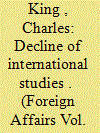

|
|
|
|
|
| Summary/Abstract |
In October 2013, the U.S. Department of State eliminated its funding program for advanced language and cultural training on Russia and the former Soviet Union. Created in 1983 as a special appropriation by Congress, the so-called Title VIII Program had supported generations of specialists working in academia, think tanks, and the U.S. government itself. But as a State Department official told the Russian news service RIA Novosti at the time, “In this fiscal climate, it just didn’t make it.” The program’s shuttering came just a month before the start of a now well-known chain of events: Ukraine’s Euromaidan revolution, Russia’s annexation of Crimea, and the descent of U.S.-Russian relations to their lowest level since the Cold War. The timing was, to say the least, unfortunate.
|
|
|
|
|
|
|
|
|
|
|
|
|
|
|
|
| 3 |
ID:
161545
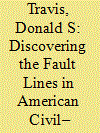

|
|
|
|
|
| Summary/Abstract |
This essay is in response to Thomas Crosbie and Meredith Kleykamp’s article that investigates relationships between what they consider to be three fault lines in the American military profession: ethical lapses, expertise, and identity. As they explore the literature to contemplate how professionalism might help to prevent ethical lapses, they also seek to reveal relationships between lapses, military expertise, and identity. To enhance the relevance of their research, it is recommended that they examine ethical lapses more broadly. Their core subject is American civil–military relations, which is a complex, contentious, and often ambiguous topic. They can mitigate the ambiguity by developing a clear problem statement and a set of research assumptions. In addition, because not all lapses are treated the same, they can be categorized to identify more serious lapses, which will allow for a focused examination of institutional responses to the lapses. Also, integrating other academic approaches such as political science and history into their research will improve the theoretical and explanatory power of their investigation. Adopting these and other aspects of inquiry will support the testing of their six hypotheses and improve our understanding of the military profession.
|
|
|
|
|
|
|
|
|
|
|
|
|
|
|
|
| 4 |
ID:
164614
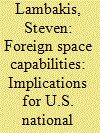

|
|
|
| 5 |
ID:
155250
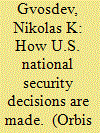

|
|
|
|
|
| Summary/Abstract |
Donald Trump’s unexpected victory in the 2016 U.S. presidential election will bring to the Oval Office a person with no past political experience. Having run on a foreign policy platform that, at times, challenged the established bipartisan orthodoxy in Washington, he must also deal with a Congress which, although nominally dominated by his own political party, is more likely to wish to exercise a close check on the new administration. Given the chill between the Republican party’s foreign policy establishment and the President-elect and with the proviso that the new Chief Executive will need to get Senatorial confirmation for his nominees to the top echelons of the executive branch departments, it raises the possibility that the new team will continue with trends already noticeable in the last three presidential administrations: to shift the focal point of decision-making away from the national security bureaucracy and the Cabinet in favor of the “palace” of advisors and White House staff surrounding the president.
|
|
|
|
|
|
|
|
|
|
|
|
|
|
|
|
| 6 |
ID:
146059
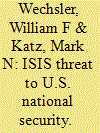

|
|
|
|
|
| Summary/Abstract |
I want to briefly go through my assessment of where we are in the fight against the Islamic State, how we got here, where we're going, and the lessons we should take from our experience thus far. Until last year, I was deputy assistant secretary of defense for special operations and combatting terrorism, where I worked on these issues on a daily basis and saw the evolution of our policies and our approach towards the Islamic State throughout that period.
|
|
|
|
|
|
|
|
|
|
|
|
|
|
|
|
| 7 |
ID:
168011


|
|
|
|
|
| Summary/Abstract |
In October 2018, the U.S. National Nuclear Security Administration (NNSA) announced its decision to reestablish a domestic uranium-enrichment capability in the United States.1 As described in its fiscal year 2019 Stockpile Stewardship Management Plan, the NNSA said there is a pending shortage of U.S.-origin low-enriched uranium (LEU) needed to fuel the nuclear reactors that produce the tritium gas used in U.S. nuclear weapons. The NNSA initially estimated a need for new supplies of LEU by 2027, but after an internal review identified additional materials, this date was deferred until at least 2038.2
|
|
|
|
|
|
|
|
|
|
|
|
|
|
|
|
| 8 |
ID:
174309
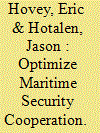

|
|
|
|
|
| Summary/Abstract |
The drawdown of U.S. forces in Iraq and Afghanistan has not engendered a more peaceful or stable world order. Rather, the United States’ post–Cold War dominance in the maritime domain is increasingly beset by challenges. In the Middle East, the U.S.-supported 33-nation maritime coalition has been stymied in developing a coherent response to Iranian aggression. In the Pacific, the United States’ longstanding relationship with the Philippines has grown increasingly strained, a fact demonstrated by President Rodrigo Duterte’s threat to nullify a 21-year-old bilateral military cooperation agreement.
|
|
|
|
|
|
|
|
|
|
|
|
|
|
|
|
| 9 |
ID:
091284
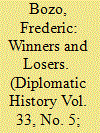

|
|
|
|
|
| Publication |
2009.
|
| Summary/Abstract |
In July 1990, a troubled Hubert Védrine, François Mitterrand's strategic adviser and spokesman, wrote to Zbigniew Brzezinski. He was frustrated with an interview that the former U.S. national security adviser under Jimmy Carter had given to a leading French daily newspaper a few days before. In the interview (Moscow had just given its final green light to German unification by accepting that Germany would remain a full North Atlantic Treaty Organization (NATO) member), Brzezinski, a widely respected pundit, had declared that "for many years, we have known that the end of the Cold War would make two winners: the United States and Germany, and two losers: the Soviet Union and France."1 Responding to what in his eyes was a "debatable" viewpoint "to say the least," Védrine argued that France, since General de Gaulle in the 1960s and under Mitterrand throughout the 1980s, had in fact made persistent efforts to overcome the Cold War and its consequences. Denying that its policies had been premised on the enduring division of Germany, he emphasized that "the German unification process had unfolded in accordance with what the French President had wished as early as July 1989." In any case, Védrine concluded, it made no sense to designate victors and vanquished in the Cold War.
|
|
|
|
|
|
|
|
|
|
|
|
|
|
|
|
|
|
|
|
|